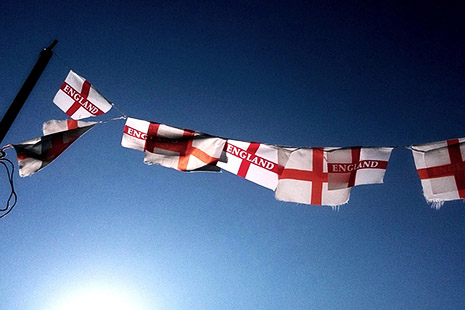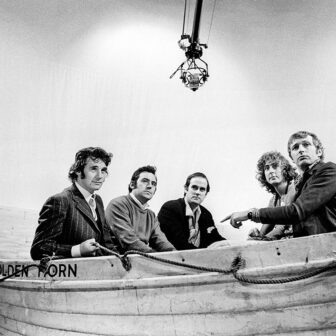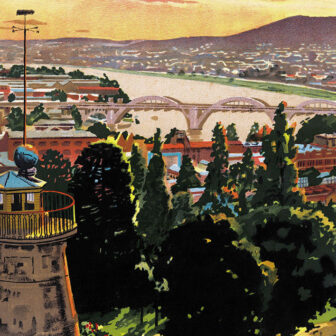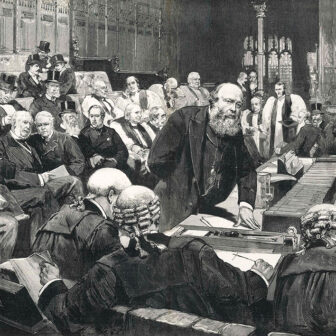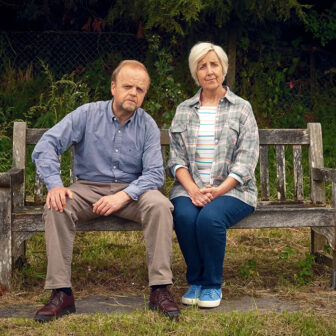England’s genius for ritual comes into its own with football’s World Cup. So ingrained are the pattern of events and the emotional cycle that dominate these high-summer weeks, one year in four, that they seem almost scripted. The very familiarity of the experience, the ever-repeated confirmation of what was already known – that, in the end, England is not quite good enough to win – is at the heart of their agonising pleasure. By the moment of exit, the on-field dramas have become woven into an intense, concentrated national journey.
The journey, always variable in its precise details, goes roughly as follows. A nervous qualification round ends on a high note, leaving a residue of expectation that, as the tournament nears, bubbles, simmers, and then – on the day of the opening match – overflows. At every point along the way, past glories (above all, a triumph as the host country in 1966), disasters and epic contests are lovingly replayed, reinforcing the sense of history’s cage yet secreting the dream of escape. (“I can take the despair. It’s the hope I can’t stand!” as Michael Frayn has one of his most English characters say.)
The group stage is difficult. A bad display provokes media scorn, rumours of dissension within the camp, changes of personnel and tactics. A defiant performance in the third game saves the day; England is through. The effect is cathartic. In an instant, everyone is onside: manager, team, media, travelling and stay-at-home fans. A wider public wakes to the story; politicians jump on the caravan; the drama, with its endless tributaries, expands to the news and feature pages.
An invisible hand delivers the national flag – the red-and-white cross of St George – to windows, lamp-posts, statues, trees and car aerials throughout the land. This is the ping! moment for columnists and intellectuals. Thanks to the national team, England’s submerged pride, buried loyalty and apologetic nationhood are released from their confines. Should we be moved, inspired, alarmed?
This demotic pageant is a symbolic expression of England’s desire for fair treatment vis-à-vis its neighbours, Scotland and Wales. Or else of protest at the Westminster (and European) elite’s patronising disdain for a forgotten country. Or of a raw ethnic nationalism that spells danger to minorities. Or of a progressive civic nationalism that heralds post-imperial renewal.
The Scots, feeling left out – their team didn’t qualify, again – can’t forbear getting in on the act. Their vocal, visible support for England’s opponents is evidence of decaying British bonds. Or else of protest against the biased pro-England media coverage beamed into defenceless Scottish homes. Or of the petty resentments of a deformed nationalism. Or of a lingering inferiorism whose remedy is to back the English team in a show of maturity.
From newspaper letters pages to radio shout-ins, the national cacophony grows. The headlines get larger, the references more martial. Every stray morsel is disgorged: the taxi firm that denies its driver the right to show the flag, the leftist bloviators who equate Englishness with racism, the far-right activists who burn the adversaries’ flag, the politician who denounces football mania as moral evasion of society’s problems.
The team reaches its fateful tryst with a traditional enemy: Germany, say, or Argentina. An epic match turns on a single, cruel incident: a red card, an injury, a missed penalty. A heroic effort ends in narrow, inconsolable defeat. Within an hour, the first editions are out with their pre-prepared, recycled headlines (“End of the world” is a perennial).
At home, the flags vanish overnight. The feature articles (“How I learned to love football”... “Half-time snacks – your quick guide to footie heaven”... “Who was St George anyway?”) are filed away. The squad returns to an appreciative welcome, trophyless but with honour upheld. By then, the inquest is in full swing. England’s failure is owed to inferior technique, the legacy of decades of neglect of sporting education. Or to the global success of a super-rich domestic league containing a surplus of non-English players. Or to poor diet, lazy lifestyles and the diversions of technology. Or to a sense of entitlement born of enduring colonial arrogance.
The mood deflates and with it interest in the rest of the tournament. A diminished audience pins its sympathy to whatever underdog, romantic or golden team is left standing. The short-lived inquest gives way to a blame game, fuelled by pumped-up campaign exclusives from inside the squad. Soon, the whole experience is tidied into a rapid-fire TV highlights package, high on emotional gesture. In already faint public memory, England’s latest misfire becomes another episode of descent from the glory of 1966. The long wait for a replay goes on.
A ritual that begins with football has a magnetising force that by its end has become all-consuming. The celebration of England, the sense of belonging and of loyalty to the national team, are never more manifest than during a World Cup (as well as during the biannual European championship, whose exuberant England-hosted 1996 competition began the national flag-fest). No wonder the occasion tends to be invested with wider significance, especially of a political kind. In particular, the travails of England’s football team in the tournament are often read as a barometer of national confidence, of its sense of identity, and even its place – or non-place – within a United Kingdom whose recasting by constitutional reform has seemingly left England without a clear role, or even a clear future.
This process, inaugurated in 1997 by Tony Blair’s New Labour government, included degrees of self-government in Scotland, Wales and Northern Ireland. It was a response both to accumulating national discontent at Westminster’s centralising rule (and in the Irish case, part of the end of the thirty-year conflict), and to what Labour’s election manifesto of that year called “a crisis of confidence in our political system.” There was provision, too, for an elected mayor in London and other cities, as well as reform of the electoral system and of the House of Lords (the oldest saga in British politics, and – since no one can agree on what the problem is – ever unfinished). But beyond the vague possibility of a regional assembly or two, there was nothing specifically for England on its own account.
Why was England left out? The obvious answer is that there was no demand for English self-government, or at least none that could easily be codified in institutional terms. The sense of a reawakened nationalism in Scotland and Wales from around the mid 1980s – often articulated in cultural terms, often taking the form of bitter political opposition to Margaret Thatcher’s Conservative government and its local subordinates – was not replicated in England. In the years 1992–97, two reformist political strands in Scotland and Wales – the nationalist and the social-democratic – were able to find common cause on the issue of devolving power from London. In England, they remained separate. Nor was there an equivalent in England to the Scottish National Party or Plaid Cymru: modern, centre-left parties advocating democratic self-government in a language of inclusive nationalism.
England’s absence from the post-1997 process came to be much discussed, and prompted varied explanations. Perhaps Thatcherism itself was a kind of English nationalism, the hurricane force of its new state–market–individual nexus flattening any lesser ones? Could it be that England, with 84 per cent of the United Kingdom’s population, was too big and diverse to be capable of incubating the more solidaristic impulses of its much smaller cousins? Was it that England’s history had enfolded the country’s governance and self-awareness so much inside Britain – and so channelled its popular sentiment upwards to power, monarchy, post-imperial Atlanticism – that its people lacked the ideological resources, including the proto-liberationist sentiment, to develop a campaign for political autonomy in their own name? Or had Britain’s more egalitarian state-forms, its public and welfare services, done a similar job in incorporating social patriotism, leaving Englishness to its classic repose in the rural, the organic, the conservative, the top-down – above all, the past?
The questions were answered in many ways. Many dismissed the idea of an English question (or, not quite the same thing, wished it to go away), and suggested that any democratic flaws could be redressed within Britain’s existing frameworks. Others embraced the notion of England’s singularity, and welcomed the prospect of an enjoyable bout of national introspection.
By the mid 1990s, this was looking harder to avoid. International as well as domestic trends were fuelling the momentum for Scottish and Welsh self-government. The end of the cold war had inscribed a host of newly independent states onto Europe’s map; many were of comparable size to Scotland and Wales (and several much smaller), and all aspired to join the European Union. The nationalist campaigns “joined the dots,” their own pro-European stance contrasting with British governments’ often abrasive relationship with the European Union.
The Conservative government of John Major made the best of a difficult hand. Major had succeeded Thatcher in 1990, won an election (even increasing the Tory vote in Wales and Scotland), and sought to turn his rise from a modest south London background into a template of the congenial society he thought post-Thatcher Britain needed. A speech on the eve of St George’s day (also Shakespeare’s birthday) in 1993 inadvertently voiced the new English difficulty:
Fifty years from now Britain will still be the country of long shadows on county [cricket] grounds, warm beer, invincible green suburbs, dog lovers and pools fillers and – as George Orwell said – “old maids bicycling to Holy Communion through the morning mist” and if we get our way – Shakespeare still read even in school. Britain will survive unamendable in all essentials.
The source of the citation, Orwell’s famous essay of 1940–41 – inspired by observation of his compatriots’ response to the Luftwaffe’s bombing campaign – had the subtitle “socialism and the English genius.” And indeed, everything else in this Orwell-soaked passage evokes an English land of loved content. In 1924, when Major’s predecessor Stanley Baldwin tried for the same effect (“The sounds of the corncrake on a dewy morning, the scythe against the whetstone, strike down into the very depths of our nature...”) he felt able to preface the encomium by expressing “profound thankfulness that I may use the word ‘England’ without some fellow at the back of the room shouting out ‘Britain.’” The whirligig of seven decades trapped Major on the other side of the barbed wire, as millions of souls across every border hollered back, “Not Britain – England!”
In the years before the 1997 election, Major and his party preserved their hard line against any form of devolution to Edinburgh and Cardiff. Blair’s victory opened the way to referendums that endorsed the setting up of a parliament and assembly in the respective capitals (as well as an assembly in Belfast following the peace agreement there). The embedding of a new and asymmetrical constitutional landscape inevitably sharpened awareness of the English exception, though in political terms it would long remain the corncrake that did not cry.
Nor did it pipe up after 1997. New Labour had offered “the regions of England” a watery valentine in its election manifesto: “In time we will introduce legislation to allow the people, region by region, to decide in a referendum whether they want directly elected regional government. Only where clear popular consent is established will arrangements be made for elected regional assemblies.” It prefaced this with the caution that “it would be wrong to impose a uniform system” since “[demand] for directly elected regional government so varies across England.”
In context, the offer had faint traces of the notion of “home rule all round,” floated intermittently since the 1870s as a fix for the United Kingdom’s inescapably lopsided governance. But it had no sense of English nationhood and interest as a whole, rather of a toolbox missing a dispensable item. The regional focus had both negative and positive justifications: England was too big to be a natural unit of devolved government, but the strength of the country’s local, including urban, affinities fitted its varied regions for this role. Indeed, the varied size of the United Kingdom’s constituent parts – in 2011, England had 53 million people, Scotland 5.3 million, Wales 3 million, and Northern Ireland 1.8 million – is often cited to argue that some form of federalism, in principle an appropriate model for a multinational state, wouldn’t work.
In time, the contrast between Labour’s desultory (and region-based) treatment of England and its loving (and nation-based) attention to Scotland and Wales – whose urban areas supplied the party with a vital surplus of parliamentary seats – became politically charged. It fuelled a potent narrative of English neglect, which, in a conspiratorial variant, weaved the European Union’s own administrative regionalism into a dark fantasy of deliberate fragmentation and betrayal.
The belief that England is under siege from internal foes aided by hostile foreigners draws on rich precedents. Mark Stoyle’s bold reinterpretation of the wars of the 1640s, Soldiers and Strangers: An Ethnic History of the English Civil War, published in 2005, is but one example. In the modern era, this story of “encroachment” has been ever replenished. The deep roots of the mentality at work in shaping it are explored in a pioneering work by the cultural historian Patrick Wright, The Village that Died for England, published in 1995.
The story pervades even the more thoughtful discourses of Englishness appearing at the turn of the millennium, with their portraits of a threat to the country’s constitutional and ethical foundations from a menacing array: urban-centric governments disdainful of English history and the British constitution, European empire-building, sentimentalist hysteria (as exhibited in the reaction to Princess Diana’s death), intellectual atrophy and moral decay. Among many others, Simon Heffer’s Nor Shall My Sword: The Reinvention of England, Peter Hitchens’s The Abolition of Britain and Roger Scruton’s England: An Elegy celebrate England’s virtues while lamenting their passing in face of unwelcome political realities, of which New Labour is the long-term outcome as well as the immediate agent. As the twenty-first century dawned, it seemed, England was at a loss.
England thus began to be felt more sharply as a political conundrum in the early New Labour years. An “English backlash” was much predicted and widely observed. How real was it? Its milder expressions, such as the Campaign for an English Parliament, formed in 1998, made little headway. A pop-cultural efflorescence bestowed politically acceptable versions of Englishness with a patina of coolness. More visceral were the huge mobilisations mounted in 2002 by the Countryside Alliance, or CA, opposing Labour’s plan to outlaw the use of dogs in the hunting of wild mammals, mainly foxes – a custom broadly observed in rural communities (among which Labour had relatively few supporters). Some felt that this revolt from the “shires,” tonally and culturally conservative, was part of a new “politics of the rural” with an English national dimension.
A comparable argument was made a decade later about the United Kingdom Independence Party, or UKIP. Does the fact that it and the CA have Scottish and Welsh support too discredit the case, or merely add nuance to it? More relevant is the fact that the Anglo-Britain inhabited by such groups – and others, on both right and left, seeking to express a political interest with a vital English component – is a landscape of the mind as much as one of territory, which is not coterminous with the country’s physical boundaries or social geography. Perhaps England’s sheer fecundity as an imagined nation gets in the way of its becoming a political one. At any rate, that still awaits.
It would be a long time coming. The English had lived through the Thatcher–Major years with comparably varied experiences to their neighbours to north and west. They had been governed all the while by English prime ministers leading governments mostly composed of English politicians, with whom millions of them felt out of sympathy – but without having the facility (as Scots and Welsh had, if they wished), to include this fact in their indictment.
This minor detail reflected a larger reality. Much political sentiment in England in the 1980s and 90s closely resembled that in Scotland and Wales. There was, for example, widespread opposition to what was felt to be remote and unaccountable power, fuelled by the central government’s legislative purge of local government and the associated privatisation of many services. Such discontent could and did often take “national” form in Scotland and Wales, and even when part of a Britain-wide phenomenon would always have this flavour. Most people in those countries were used to operating with a dual, Scots/Welsh and British, identity, according to circumstance – one reason why they had little difficulty in adding a European one.
Here, England was – as some Scots like to say of themselves – different. (The conceit, and the correction, work both ways. Labour’s former deputy leader Roy Hattersley once recalled a train journey north of the border with John Smith, who led the party from 1992 to 1994. The voluble Yorkshireman, impressed by what he was seeing, observed: “Scotland really is different.” The lawyerly Smith glinted: “No, no. You mean England is different!” Both, of course, are half-right.)
Different in this case, for in expressing their social discontent or democratic claims the English had no easy recourse to a distinctly national (meaning English) frame of argument with a political edge or as part of a strategy for institutional redress. Most English people had had no pressing reason to develop a dual, English and British, identity, at least in the political sphere; they tended to make no such distinction, without intending offence to others’ sensibilities. In new political circumstances, they were increasingly obliged to.
For example, post-devolution Scotland continued to have seventy-two MPs in Westminster (reduced to fifty-nine in 2005) as well as the 129 members of the new Scottish parliament, or MSPs, in Holyrood. The former are able to vote on all matters before the House of Commons, including those (such as health and education) that in Scotland are now the responsibility of its parliament. The political implications are heightened, and the sense of inequity reinforced, by the fact that most Scottish MPs represent the Labour Party (currently forty-one, to the Conservatives’ one).
This, the “West Lothian question” – please don’t ask – rivals “reform of the House of Lords” in Britain’s antiquity stakes. An official report published in March 2013 recommends one solution: that England-related questions in the Commons should be voted on “only with the consent of a majority of MPs sitting for constituencies in England.” Any movement on the report is now in abeyance at least until the outcome of Scotland’s independence referendum.
Even in terms of its own limited definition of England’s democratic deficit, New Labour made little progress in its decade in office (assuming that Gordon Brown’s inheritance of the prime ministership from Tony Blair in June 2007 was the end of the “New”). In 2004, a referendum was held over the creation of an assembly in England’s northeast, which was seen as the exemplary candidate for the regional experiment. The proposal fell by 22 per cent to 78 per cent, on a 47 per cent turnout. Plans for a sequel in the northwest were abandoned. The proposal for elected mayors in English cities has had a patchy outcome, with most local referendums rejecting the option. In England’s whole devolutionary venture, London – where the elected mayor–assembly model has since 2000 become a secure element of the city’s governance – is, as so often, far ahead.
But the lack of political movement notwithstanding, a sort of English awakening has been evident in the years 1997–2014. Many polls have tracked a rise in people’s sense of English identity and in those believing the post-devolution settlement is unfair to England, though numbers favouring an English parliament show little movement (a British Social Attitudes survey of May 2014 finds 19 per cent in support, almost the same as in 1999). Many academic studies, think-tank reports, novels and artistic projects exploring England’s predicament continue to enrich debate; among the most valuable studies are Robert Colls’s Identity of England, published in 2002, and Michael Kenny’s The Politics of English Nationhood, published in 2013. “England, My England: A Festival of Englishness,” hosted by the Institute of Public Policy Research, or IPPR, was held in London in October 2013; this followed its optimistically titled 2012 report, The Dog that Finally Barked: England as an Emerging Political Community.
The awakening reflects Britain’s political development over two decades, but also the profound impact on England of globalisation and immigration – an impact highly differential across the country, especially between London (and other big cities) and the rest. The effects of these forces on Englishness, too, are far from simple or uniform. In many respects globalisation and immigration have increased the attraction of traditional ideas of Englishness, which flourish more than ever, often tidied or reinvented for global tastes, while also creating space for newer ones to emerge, which in turn often begin with subversive intent before curdling into conformity. That is to say, the “old” as well as the “new” are in flux; there will be no straightforward transition from one to another. England doesn’t work like that.
Except in football-based fantasy. Such is “progressive patriotism,” a cultural-political tendency sparked in the 1990s by honourable efforts to combat the pernicious influence of the racist extreme right on supporters of England’s national team. It extended from football through music to a variant of left-wing politics that sought a contemporary equivalent of the link between Englishness and the left forged in the epic circumstances that produced George Orwell’s landmark essay. Its rhetoric – most prominently from the singer-songwriter Billy Bragg – has focused on the need to “reclaim” the English flag from the far right. (In a lecture on national identity in December 2013, Sunder Katwala, director of the think-tank British Future, has some perceptive reflections on this and related themes.)
The initial context of right-wing infiltration of football gave the tendency a welcome radical aura, as did its offer of a healthy challenge to the default cynicism of the English far left. But in the political field it became a category mistake, suffering from the instrumentalism embodied in its name, which marked the distance from the very affective community it sought to embrace. If “progressive patriotism” had an innovatory element when set against xenophobic expressions in the sporting arena, it was merely alternative in the political one. It is long enfolded safely into the World Cup ritual.
Programmatic conceptions of England, with their mix of didacticism and bad faith, have an eternal appeal on the left. Jon Cruddas, head of the Labour Party’s policy review and champion of its Blue Labour current – which in more doleful moments, resembles another version of “encroachment” – says “Labour has to build a democratic, socialist and republican cross-class alternative to reactionary English nationalism.” But a nation – England, at the risk of too much exceptionalism, least of all – can’t be conscripted to a political project. England is England. People who have such designs on it never even reach the crease.
Football makes nothing happen. But if the English patriotism on display during a World Cup has somewhere to go politically, it will be because the English, in all their complicated multifariousness, find ways to talk and listen to each other and decide together what they want. If that turns out to be a new institution such as a parliament to represent them, they will in turn need movement, agency, leadership and strategic vision to get it. In any event it will be a long haul. The wait goes on. •
